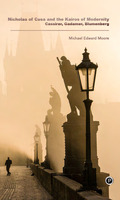Nicholas of Cusa and the Kairos of Modernity: Cassirer, Gadamer, Blumenberg
Author(s)
Edward Moore, Michael
Collection
ScholarLedLanguage
EnglishAbstract
In this far-reaching essay, historian Michael Edward Moore examines modernity as an historical epoch following the end of the medieval period — and as a “messianic concept of time.” In the early twentieth century, a debate over the meaning and origins of modernity unfolded among the philosophers Ernst Cassirer, Hans-Georg Gadamer and Hans Blumenberg. These thinkers tried to resolve the puzzle of the fifteenth-century master Nicholas of Cusa. Was Cusanus the last great medieval thinker, his ideas a summa of medieval tradition? Or was he a mysterious epochal figure, seated at one end of the bridge leading to modern thought? Nicholas of Cusa lived during a time of historical and existential crisis, or kairos, when medieval governments and cherished sources of unity were shaken. Likewise, the debate over his significance took place during a later phase of crisis for Europe, in the decades before and after the Second World War, when the collapse of European civilization was witnessed. Moore argues that modernity, so intently examined as an historical and spiritual problem, has significance for our contemporary sense of crisis.
Keywords
Middle Ages; modernity; Nicholas of Cusa; intellectual history; philosophyDOI
10.21983/P3.0045.1.00ISBN
9780615840550OCN
1048120102Publisher
punctum booksPublisher website
https://punctumbooks.com/Publication date and place
Brooklyn, NY, 2013Classification
Medieval Western philosophy


 Download
Download